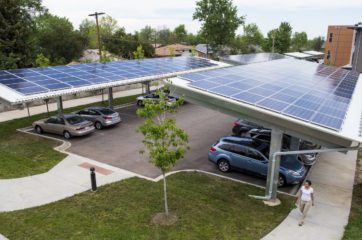You might not think of our nation’s capital as a hotbed of innovative climate policy. Certainly, a number of headlines coming out of DC have been negative. For instance, last month when the Trump administration attempted to bury a report saying Trump’s policies will result in billions in dollars of damages from climate change, or back in September when the Department of Transportation concluded that fuel standards should be rolled back because climate change was going to happen anyway. But to find the cutting edge fight against climate change you need look past 1600 Pennsylvania Ave and down to 1350 Pennsylvania Ave, the seat of the City of Washington, DC’s Government.
Recently re-elected Mayor Bowser’s ambitious plan to fight climate change, the Clean Energy DC plan, outlines 77 actions that help reduce greenhouse gas emissions in the district 50% by 2032, and becoming carbon neutral by 2050. A bill that just passed DC Council authorizes funding and authority for the District government to take such aggressive action on climate change.
The Clean Energy Omnibus Amendment Act of 2018 implements a number of policies that would have any greenie drooling. The bill establishes a 100% RPS standard by 2032; expands the District mandated carve out for rooftop solar; and promotes electrification by increase the surcharge on natural gas and fuel oil purchases in the district. One of the most aggressive and innovative policy under the act would be to establish a Building Energy Performance Standard (BEPS) for existing buildings in the District.
BEPS would be the first policy of its kind implemented in the country. Based on the District energy benchmarking data, the worst performing private and publicly owned buildings determined by the District median ENERGY STAR Score would be required to take specific measures to reduce the energy consumption. Every five years a new standard would be established and whichever half of buildings fall below the standard will need to make improvements. In effect the bill would establish a cap on energy consumption for buildings in the district, then every five years it would reduce the new cap. Initial research shows that BEPS would result in a 20% reduction in the energy consumption for the total building stock for the District (a 1.05 million ton reduction in CO2e annually).
Currently, the bill outlines two compliance paths for those buildings, either 1) reduce energy consumption by 20% over 5 years, or 2) implement a number of low-cost easy energy efficiency measures. The bill also leaves it to the District government to establish additional compliance pathways as it sees fit. This opens the District to exploring possibly even more exciting policy avenues like Energy Performance Credits that could be traded on open marketplace.
The concept behind the policy is familiar. Similar to how renewable energy projects earn Renewable Energy Credits (RECs) to account for the climate benefit of the project, buildings in the district that implement energy efficiency projects could earn Energy Performance Credits (EPCs). The value of these credits would be determined by the open market, but the issuing and certifying of each credit would be administered by the District Government. These EPCs would could only be earned by buildings not subject to BEPS (those above the District median ENERGY STAR Score) could earn the credits. Additionally, the credits could only be issued for verified energy savings tied back to a specific energy efficiency project.
Demand for the credits would come from the District establishing an additional compliance pathway to BEPS. Buildings subject to BEPS could purchase EPCs to count towards the energy reduction goals. These EPCs would be traded over a marketplace administered by the district government.
Perusing such a policy would solve two issues currently unaddressed by BEPS: 1) how to incentives buildings above the district median ENERGY STAR Score continue to improve energy performance and 2) how to assist buildings that are unable to meet the other compliance pathways due to unforeseen circumstances. Additionally, the implementation of a performance marketplace could be a catalyst for energy efficiency finance in the district. Buildings interested in making energy efficiency upgrades could commit to selling expected earned EPCs to interested brokers in return for upfront capital.
There are a number of details that would need to be worked out to implement such a policy. Namely, defining a common definition of the new credit and developing an actual marketplace to track certification, selling, and retiring of credits. As a member of the team that will be implementing the energy performance standard as a whole, you can bet that I will be pushing the district to look into establishing this marketplace.
Already other cities have started to follow suit. New York City just introduced a bill that would cap the emissions allowed from the city’s existing building stock. And other cities like Chicago and Seattle are exploring their options. But while the federal government, and some cities fall behind on their climate commitments, DC has taken a large step forward towards tackling climate change while leaving avenues for exploring new polices wide open.









